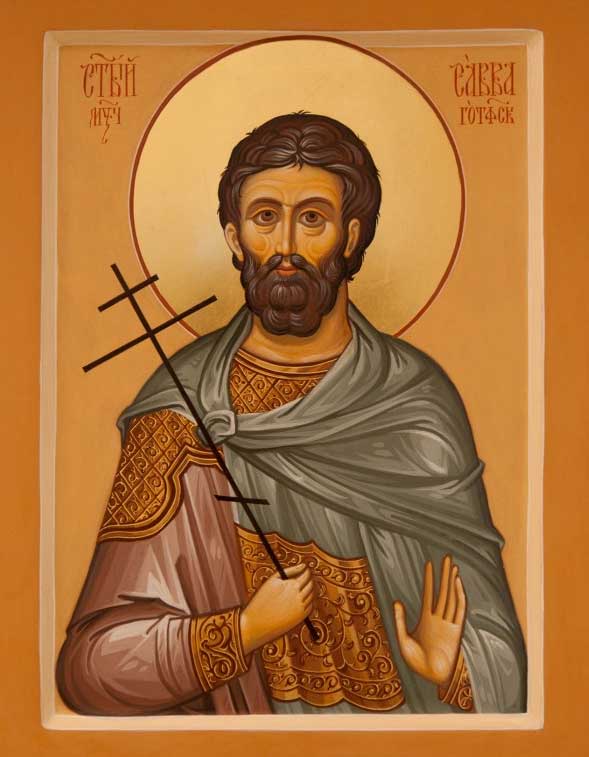
The Holy Martyr Sava, a Goth, lived during the fourth century. At this time the Arian bishop Wulfilas preached Christianity among the Goths, and St Sava was among those who were baptized.
St Sava led a virtuous life, devout, peaceful, temperate, simple, and quiet. He avoided women, and spent all his days in prayer. He often sang in church and devoted himself to its welfare, boldly preaching Christianity.
The Gothic princes and judges, under the influence of the pagan priests, began a persecution against the Christians and demanded that they eat meat offered to idols. Many of the pagans, to save the lives of their friends and relatives who had accepted Christianity, gave them ordinary meat instead of meat offered to idols.
Some Christians agreed to such a ruse, but St Sava refused and declared that Christians ought to confess their faith without dissimulation. After this, St Sava was driven out by those who lived in his village, but they later asked him to return. When the persecution of Christians had intensified, the fellow villagers of St Sava decided to go to the judge and swear that there were no Christians among them. St Sava declared, "Do not swear for me, because I am a Christian."
The inhabitants then swore that there was only one Christian in their village. On the judge's orders, St Sava was brought to him. The judge, seeing his poverty, decided that he could neither help nor harm anyone, so he set him free.
Meanwhile, the persecution continued. Soon, Atharid, one of the Gothic military commanders, descended on the village during the Feast of Holy Pascha. St Sava was preparing to greet the Great Feast with Bishop Guthik, but along the way an angel returned him to his own village. The priest Sapsal had recently arrived there from Greece. Soldiers arrested Sapsal and St Sava, whom they did not even allow to get dressed.
The priest rode on a cart, but St Sava had to walk naked behind the cart through the thorns, and they beat him with rods and switches. The Lord preserved the martyr, so that in the morning when they reached the city, St Sava said to his oppressors, "Look at my body, and see whether there are any traces of the thorns or of your blows."
The soldiers were astonished, seeing the martyr healthy and unharmed, without the slightest trace of injury. Then they stretched St Sava on the axles of a cart, and they beat him the whole day. During the night, a certain pious woman got up to prepare food for the household, and seeing the martyr, she set him free. He began to help her with the housework.
During the day, by Atharid's order, they suspended St Sava from the lintel of the house. They placed meat offered to idols before him and the priest, offering to set them free if they ate it. The priest Sapsal replied, "We would prefer that Atharid crucify us, than to eat meat defiled by devils."
St Sava asked, "Who has sent this food?"
"Master Atharid," the servant replied.
"There is only one Master, God, Who is in Heaven," said the martyr. In anger one of the servants struck St Sava in the chest with a spear. Everyone thought that the martyr was dead, but the saint did not feel any pain. He said to the one who had struck him, "Your blow felt as if you had struck me with soft wool."
Atharid gave orders to put St Sava to death. They left the priest Sapsal tied up, and led St Sava to the River Mussova to drown him. Along the way the saint gave thanks to God for allowing him to suffer for His Holy Name.
During all this the servants said, "Why shouldn't we free this innocent man? Atharid will not find out if we free him." St Sava heard them and cried out, "Do as you are commanded! For I see angels coming with glory to receive my soul!" Then they threw the martyr into the river, after they tied a large beam of wood to his neck.
St Sava suffered on April 12, 372, when he was thirty-eight years old. The executioners recovered the body of the martyr and threw it on shore, but Christians later hid it. Still later, one of the Scythian leaders, the Christian Junius Saran, brought the relics of St Sava to Cappadocia, where they were reverently received by St Basil the Great (January 1).
 The Holy Martyr Sava, a Goth, lived during the fourth century. At this time the Arian bishop Wulfilas preached Christianity among the Goths, and St Sava was among those who were baptized.
The Holy Martyr Sava, a Goth, lived during the fourth century. At this time the Arian bishop Wulfilas preached Christianity among the Goths, and St Sava was among those who were baptized.